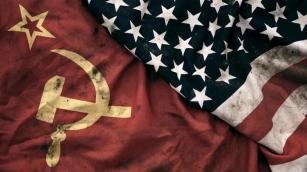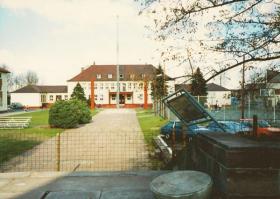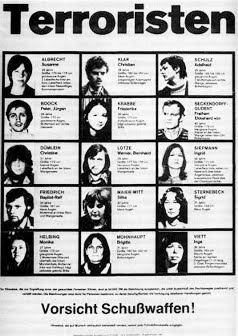
The flags of the United States of America and the former Soviet Union
The Cold War is perceived by at least a few historians as a simpler time compared to today’s confusing and chaotic Gordian knot of post 9-11 global tumult. Similar to a game of chess, the world was divided in half by two superpowers, the United States of America, and the Soviet Union from roughly 1946 until 1991. Each country had (and still has, albeit smaller) an arsenal of thermonuclear weapons locked, loaded, and aimed at each other with a combined size that assures for mutual destruction, but ironically it was this mutually assured destruction that probably kept the leaders of each superpower from initiating their launch codes during politically fraught events like the Cuban Missile Crisis.
In addition to the huge nuclear arsenals, each superpower had their own set of allies situated all over the globe. The US had the Western European countries (many of them members of NATO) and the USSR had the Eastern European countries, known as the Warsaw Pact. Each superpower was led by (mostly) smart historic figures with, at the very least, a modicum of common sense. Sure, there were a few odd anomalies – the mass-murderer Stalin comes to mind, as well as Khrushchev, and Nixon. And it wasn’t a precarious detente the world over. There were a series of mystifying and atrocious blood baths that killed millions of people on the Korean peninsula, Vietnam, Cambodia, much of the Middle East, Africa, and Central and South America from the end of World War II and on.
I have an old and creaky memory of participating in a duck and cover drill that was orchestrated over the PA system by our principal, Mr. Baron at Dresden Elementary School. It was 1976, our country’s bicentennial year, and by this time these drills were considered archaic relics from the 1950s and 60s. Many of us sixth graders thought that crouching under our desks was silly, which was fostered in part by our teacher, Mr. Miracola who smirked and rolled his eyes through the whole thing. Perhaps there was some global crisis that motivated Mr. Baron to initiate the drill, or maybe it was a directive ordered by the Superintendent of Schools. Who knows? The reasons for the drill are probably lost to the ages, or stashed in some filing cabinet in the basement of Utica Community Schools.
But this memory pales in comparison to something that happened ten years later in 1986 while I was in the Army and stationed in what was then West Germany. Had a diabolic plan not been inadvertently thwarted I would more than likely not be alive today.

Azbill Barracks in Rüsselsheim, West Germany. Photo credit: Kristen Blake-Awe
I was stationed at a small transportation unit that was located (oddly) in a suburban neighborhood of a small town with a large automobile factory as its primary employer. There was a high school next door, a large sports facility behind the motor pool, and train tracks that ran behind the barracks. To say that our army post stuck out like a sore thumb in this otherwise idyllic setting is an understatement. A small down town (with a couple of bars popular with the GIs) was a short walk away, as was the train station from where the cities of Mainz, Wiesbaden, and Frankfurt could be reached within a half hour. There were perhaps 250 soldiers, give or take, most of whom drove OD-green semi-trucks all over West Germany, all overseen by a dozen or so transportation corps officers. It was a well-run outfit under the command of an extraordinary battalion commander and command sergeant major, both of whom served our country with honor and distinction in combat.
Unlike 90% of the soldiers stationed at our small post, I was not a truck driver. I was in the signal corps and trained as a radio-teletype operator. This was mostly a field occupation, and my primary responsibility was to set up and operate a mobile communications facility, but our unit rarely went on field exercises so I worked in battalion security, known in army parlance as the S-2. My office was a small, vault-like room in the basement of battalion headquarters with a door that could only be opened by dialing a combination lock. This was where the classified documents were kept. I was a clerk, and a classified document custodian. One of my most important duties was to give security briefings to all the new arrivals, both officers and enlisted personnel. I briefed them on issues that pertained to personal security; I reiterated that we were serving in a foreign country and that it was easy to become complacent about personal security, telling them to never be predictable in their daily movements, to take different routes to and from the post. To not talk about their occupations as truck drivers, to never discuss their destinations with anyone, to never reveal the items they were hauling hidden under the tarps of their trailers, and to immediately report any sightings of Soviet Military Liaison Mission vehicles moving in and around their trucks or convoys. Some aspects of my job made me feel like a secret agent – pretty cool for a guy a couple years out of high school! I was known as the security guy, but did I practice what I preached when it came to not being predictable in my daily movements? In a word… no.

RAF wanted poster, circa 1970s
One of the reasons that we urged unpredictability was because of a terrorist organization known as the Baader-Meinhof Gang, later known as the Rote Armee Fraction, or RAF. This was a far-left terrorist organization that had affiliations with, and was supported in part by East Germany’s Stasi, or secret police. The RAF was formed in 1970 and was responsible for a large number of sensational terrorist attacks on German CEOs, Bankers, and the US Armed Forces stationed in West Germany. There were wanted posters of RAF terrorists on the bulletin boards of every army and air force base in West Germany, and the black and white photographs on these posters were old, grainy, and of poor quality. Some of the terrorists pictured on these posters actually looked more like raggedy college students coming off a three day drunken bender. But they were dangerous and would not hesitate to kill for their cause. In 1985 in nearby Wiesbaden, a US Army Specialist was lured from a nightclub and driven to the nearby Taunus forest where he was shot in the head. The next day his military ID was used by the RAF to gain entry onto Rhein-Main Air Base where a car bomb was detonated in front of the base commander’s office. Two air force personnel were killed in this explosion.
It was around this time that I requested permission to move off base. I had found a small apartment in nearby Raunheim, and my request was granted because a lot of new soldiers had arrived and we were running out of barracks space. I was happy to finally have some privacy after sharing the barracks with my fellow soldiers for the last three years. It was a ten minute car ride from my apartment to the post and roughly twenty minutes by bicycle. I enjoyed riding my bike to the post because there was hardly any traffic, and I always took the “back way” – a jaunt down a little used road, through a forested area, with an exercise track adjacent to the road. On my way home I’d often see a German neighbor or two, jogging and stopping to exercise along the path. We’d sometimes wave to each other as I passed by on my bike.
In the summer of 1986 a member of the RAF was spotted in the town where I lived at a café by an observant German citizen. She (the RAF terrorist) was sitting outside the café, evidently enjoying an ice cream treat. The police were surreptitiously notified and after a dramatic shoot-out, she was captured and taken to the police department for processing and interrogation. No one, thank goodness, was hurt.
I was flabbergasted. Because I gave security briefings I had become mildly obsessed with the RAF. I carefully scrutinized their photographs whenever new wanted posters became available. I wondered why on earth this terrorist would come here to the town where I was stationed—a veritable Palookaville of West Germany! Was it because of the large automobile factory? Was it because of our small army post? Couldn’t be, I thought. I had a German friend whose father was a detective for the town’s Police Department. I rationalized that, since I worked in security, perhaps he would be willing and able to give me some information regarding the capture of this terrorist. I spoke to him a couple of days after her capture and he told me that he absolutely could not say anything about it—that everything related to it was confidential, that it was an ongoing investigation; that there were people at the department whose job it was to give press releases, but it wasn’t for him to share—no, not a shred of information! I tried pressing him, but he was firm and gave me a big, resounding, “NEIN!” Oh well… at least I tried. Eventually, the RAF terrorist was charged and convicted for, among other things, the murder of the soldier in Wiesbaden a year earlier, and she was sent to prison for a long time. Things calmed down after that, and I incorporated into my security briefings that a member of the RAF had been captured here, in our very town. I told the new arrivals to be diligent, careful, and unpredictable in their patterns because, “…you don’t know who’s observing you in your daily movements.”
Cut to the summer of 2003. My wife and I are on vacation in what is now a reunified Germany. The Cold War had been relegated to the history books and we were now living in our post 9-11 world. We stayed with my German friend (the son of the now retired detective), and his wife. Typical of these wonderfully hospitable people, they had made reservations at a popular restaurant and invited all the other friends I had made while stationed there all those years ago. A few hours later, about twenty people were gathered around that restaurant table!
I don’t remember exactly how we got onto the subject, but I asked the retired detective (whom I was sitting next to) if he remembered the RAF terrorist incident that had happened seventeen years prior. He looked upward, exhaled, and replied that it was a long time ago. I asked him if he remembered anything about it, or if he knew, for example, why she had come to our town. From what he remembered, it eventually came out that she was on a mission to get a US Military ID Card in order to get onto a US base to detonate a bomb. The RAF had zeroed in on a soldier who often rode a bicycle down a little used road which cut through a forest. Had she not been captured, her team was going to kill the soldier early the next morning and use his ID card to accomplish their mission. I put two and two together, sat there for a few seconds, then blanched.
I did not tell the retired detective that I was the soldier who rode the bike through the forest. Instead, I thanked him for sharing because, after all these years, I sometimes still wondered about it. We moved onto other subjects, and there were other people to talk to and catch up with, so… I filed it away. It took many years before I told anyone what I learned that evening.
My German friendships have held strong to this day, and I’ve since made new and important friendships with people who used to live on the other side of the Iron Curtain through student exchange programs. I know first-hand the good that comes from walls being torn down. Chess should only ever be a board game, and Gordian knots can be untied or cut. I like to imagine a world where our fears and prejudices will one day diminish to nothing, and that we’ll no longer find it necessary to divide ourselves into us versus them scenarios, and no one will think it necessary to build anymore walls.
Perhaps one day we’ll hold our leaders accountable for the divisions they sow. But I worry; now more than ever, that that day may be a long way off….
very good story, I enjoyed reading it, brought back memories. Many of those events I remember quite well. With the bomb on Rhein Main, the soldier that was shot for his ID card, The posters of the terrorist. I remember giving the same briefing many times, our Vault in the basement. Again, it was great reading this, you articulated it very well.
LikeLiked by 1 person
We were given a lot of responsibility. You were a really good NCOIC of the S2 and I look back on those days with great fondness.
LikeLike
A really very good story! I have contacted the Archive of our local newspaper for more info.
Let’s hope they have not scrapped the old files!
LikeLiked by 1 person
Thank you. It would be interesting to see their archive relating to the apprehension.
LikeLike
Wow does that bring back memories. I was the same person, in the same role while I was stationed there 88-90. I of course wasn’t around during the bombing or murder but I do remember the stories and briefings.
LikeLike
I can’t believe how long ago that was already. I was there in Russelsheim Dec ’85 – Dec ’87 (78th Trans). I was a driver in second platoon my first year, and I did my second year in operations under truckmaster Ronnie Streeter. Two of the best years of my life. I miss those days.
Amazing story, Lark. I remember the Red Army Faction posters too. You must have sh*t a brick when your friend’s father told you about that plot. I’m glad you dodged that bullet… literally.
LikeLike
I too look back on my days as Azbill Barracks with great fondness, and regard them as among the best years of my life. So many great memories.
LikeLike
I was stationed at Azbill Barracks from approximately January 1982 – about 30 May 1983. I actually was assigned to the 106th Trans Bn in May 1981. The battalion HQ when I first got there was on Lee Barracks because the HQ building at Azbill was being renovated. I was the Battalion Chemical NCO while stationed there. I remember all the terrorist activities of the Bader Mein Hoff gang while I was there. As a matter of fact, the Chemical NCO for 70th Trans Co. had his car blown up just outside of his quarters. Luckily he was not in the c ar when it blew up. The license plate from his car was blown off and hit a car on the opposite side of the street and stuck in the door. The alternator from his car was found 1/4 mile away.
LikeLike
Wow! Yes, those RAF terrorists meant business!
LikeLike